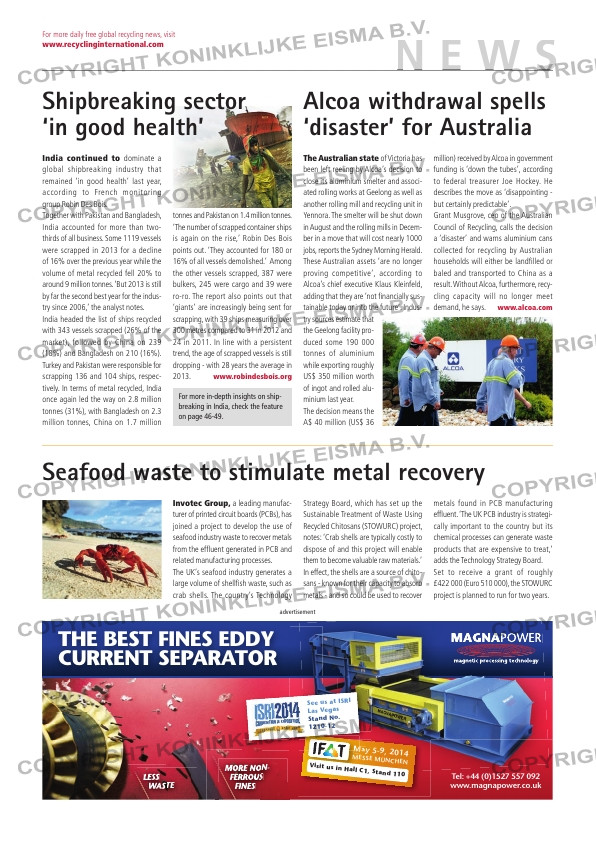Page 19 from: March 2014

N E W S
For more daily free global recycling news, visit
www.recyclinginternational.com
advertisement
LESS
WASTE
MORE NON-
FERROUS
FINES
THE BEST FINES EDDY
CURRENT SEPARATOR
Tel: +44 (0)1527 557 092
www.magnapower.co.uk
May 5-9, 2014MESSE MÜNCHENVisit us in Hall C1, Stand 110
See us at ISRI
Las Vegas
Stand No.
1210-12
The Australian state of Victoria has
been left reeling by Alcoa’s decision to
close its aluminium smelter and associ-
ated rolling works at Geelong as well as
another rolling mill and recycling unit in
Yennora. The smelter will be shut down
in August and the rolling mills in Decem-
ber in a move that will cost nearly 1000
jobs, reports the Sydney Morning Herald.
These Australian assets ‘are no longer
proving competitive’, according to
Alcoa’s chief executive Klaus Kleinfeld,
adding that they are ‘not fi nancially sus-
tainable today or into the future’. Indus-
try sources estimate that
the Geelong facility pro-
duced some 190 000
tonnes of aluminium
while exporting roughly
US$ 350 million worth
of ingot and rolled alu-
minium last year.
The decision means the
A$ 40 million (US$ 36
million) received by Alcoa in government
funding is ‘down the tubes’, according
to federal treasurer Joe Hockey. He
describes the move as ‘disappointing –
but certainly predictable’.
Grant Musgrove, ceo of the Australian
Council of Recycling, calls the decision
a ‘disaster’ and warns aluminium cans
collected for recycling by Australian
households will either be landfi lled or
baled and transported to China as a
result. Without Alcoa, furthermore, recy-
cling capacity will no longer meet
demand, he says. www.alcoa.com
Alcoa withdrawal spells
‘disaster’ for Australia
India continued to dominate a
global shipbreaking industry that
remained ‘in good health’ last year,
according to French monitoring
group Robin Des Bois.
Together with Pakistan and Bangladesh,
India accounted for more than two-
thirds of all business. Some 1119 vessels
were scrapped in 2013 for a decline
of 16% over the previous year while the
volume of metal recycled fell 20% to
around 9 million tonnes. ‘But 2013 is still
by far the second best year for the indus-
try since 2006,’ the analyst notes.
India headed the list of ships recycled
with 343 vessels scrapped (26% of the
market), followed by China on 239
(18%) and Bangladesh on 210 (16%).
Turkey and Pakistan were responsible for
scrapping 136 and 104 ships, respec-
tively. In terms of metal recycled, India
once again led the way on 2.8 million
tonnes (31%), with Bangladesh on 2.3
million tonnes, China on 1.7 million
Invotec Group, a leading manufac-
turer of printed circuit boards (PCBs), has
joined a project to develop the use of
seafood industry waste to recover metals
from the effl uent generated in PCB and
related manufacturing processes.
The UK’s seafood industry generates a
large volume of shellfi sh waste, such as
crab shells. The country’s Technology
Strategy Board, which has set up the
Sustainable Treatment of Waste Using
Recycled Chitosans (STOWURC) project,
notes: ‘Crab shells are typically costly to
dispose of and this project will enable
them to become valuable raw materials.’
In effect, the shells are a source of chito-
sans – known for their capacity to absorb
metals – and so could be used to recover
metals found in PCB manufacturing
effl uent. ‘The UK PCB industry is strategi-
cally important to the country but its
chemical processes can generate waste
products that are expensive to treat,’
adds the Technology Strategy Board.
Set to receive a grant of roughly
£422 000 (Euro 510 000), the STOWURC
project is planned to run for two years.
Seafood waste to stimulate metal recovery
For more in-depth insights on ship-
breaking in India, check the feature
on page 46-49.
tonnes and Pakistan on 1.4 million tonnes.
‘The number of scrapped container ships
is again on the rise,’ Robin Des Bois
points out. ‘They accounted for 180 or
16% of all vessels demolished.’ Among
the other vessels scrapped, 387 were
bulkers, 245 were cargo and 39 were
ro-ro. The report also points out that
‘giants’ are increasingly being sent for
scrapping, with 39 ships measuring over
300 metres compared to 31 in 2012 and
24 in 2011. In line with a persistent
trend, the age of scrapped vessels is still
dropping – with 28 years the average in
2013. www.robindesbois.org
Shipbreaking sector
‘in good health’
RI-2-2014-NEWS.indd 19 05-03-14 15:47



